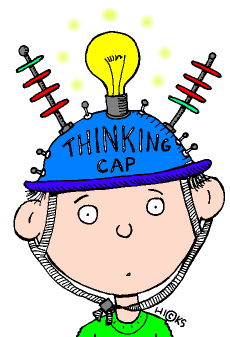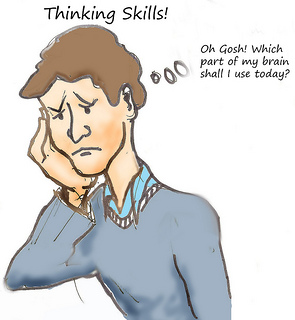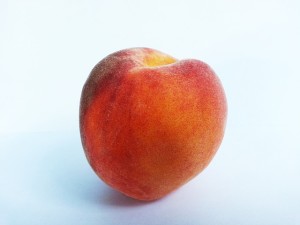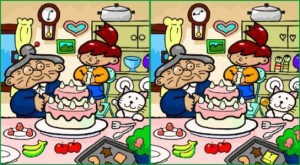
Today a practical exercise to help understand more about what cognitive function means.
Earlier we looked at a brief introduction, of what cognitive means today a more concrete way to understand what it is all about.
To get your own cognitive cogs working do the exercises below before you read to the end. Then read on to the answers. Compare your list with those below and see how you go. You are also welcome to use this exercise to help others understand what cognitive means. It may be helpful to do it as a small group.
Even simple sounding tasks may need complex thinking. If you want some examples to get a better idea of cognitive function and skills a number are listed here:
[box style=”rounded”]Examples of Cognitive Skills from Serendip Studio,” a digital ecosystem for exploring”[/box]
Definition of Cognitive Function
Before we launch into a big thinking exercise, here is a reminder of what “cognitive” means:
The brief definition:
“Cognition is the way we use our brains to think”
A bit more about cognition:
- Think about “cognition” as; the way we think, reason, remember and use our intellect.
- Cognitive function is not our intellect. They are the tools we use in our daily life to access our intellect.
- It is not our knowledge, it’s the way we process and use our knowledge.
- It is about the thinking part, not our physical (motor) functions.
Launch Your Own Thinking and Cognitive Powers

Now put your own cognitive skills to work. Have a go at listing the cognitive function, skills, qualities, tasks, processes you would use to complete each of the tasks below. These are making a cup of tea: Learning a poem: and Removing a stone from your shoe.
[unordered_list style=”tick”]
- Work through each example and make a list of the cognitive function and abilities you would use to complete the task.
- Don’t look further than this list of tasks just yet. See how you go solo first.
- If you are stuck you could do the first exercise then compare your list with the list below before completing the final two.
- To help you think it through you could begin by completing the actual task then write down the “brain work” (the cognitive abilities) needed to carry it out.
[/unordered_list]
Spoiler Alert – example answers are listed below so don’t look until you finish your own list!
Have A Go: Three Activities:
1)Making a cup of tea
What are the cognitive functions and skills needed to make a cup of tea? If it’s not something you are familiar with click on the link below for a short video to help you out;
[box style=”rounded” border=”full”] MAKING A CUP OF TEA [/box]
2) Learning a short poem
What are the cognitive functions and skills needed to learn this Haiku poem and then recite it?
A haiku: seven-
teen syllables split five sev-
en five. An haiku? by Douglas Scotney
3) Remove a stone from your shoe
Imagine you have (or you could actually put) a stone in your shoe, and remove it. What are the cognitive functions and skills needed ?
Cognitive Functions. The Brain Work for Completing Tasks
What did you come up with?
What cognitive functions did you need for the task? Check your list against the lists below.
If you have thought of a cognitive function you would use that is not listed in the answers please share in the Comments below.
Making a Cup of Tea or Coffee
[unordered_list style=”green-dot”]
- Planning and organisation – preparing, planning and carrying out the task safely and efficiently
- Initiation –being able to start the task
- Procedural memory – remembering how to carry out the task
- Judgement and decision making – making decisions about how strong and how hot to make tea
- Recognition and naming of objects – knowing what a teapot and cup or mug is
- Sequencing steps – putting the steps needed in the right order
- Recall of prior learning – remembering past learning of the same task
- Fine motor skills – finer small movements such as fingers
- Hand – eye co-ordination – the eyes help the hands to operate and the hands guide the eyes.
- Spatial awareness – knowing where the objects you need are, knowing the spaces you are in
- Comprehension – making sense or understanding what you are doing or seeing
- Word recognition – recognises the words you read
[/unordered_list]
Learning a sentence or paragraph and reciting it
[unordered_list style=”green-dot”]
- Concentration and attention – ability to focus on task and attend to necessary information until completion of task
- Memory – recall of information
- New learning – ability to learn new things
- Reading – being able to read and understanding what is read
- Motivation – have desire and will to start and continue to completion
- Comprehension – understanding of what is written
- Verbal skills – ability to form and speak words
[/unordered_list]
Notice and Remove a Stone from Your Shoe
[unordered_list style=”green-dot”]
- Problem solving – ability to work out what the problem is and solutions
- Initiation – recognise need and commence task to solve problem
- Flexibility – ability to change direction and try new things
- Sequencing – able to put steps in right order and complete them
- Fine motor coordination – dexterity to carry out task
- Identify Left from Right
- Pain recognition – able to register and respond to pain
- Attention – able to concentrate and attend to the problem and solution
- Balance – ability to maintain balance in order to complete task safely.
[/unordered_list]
Four Key Points About Cognitive Function

1) Cognitive damage is damage to the way we think and do. It is NOT intellectual damage. it is the way we use our intellect.
2) Damage to the brain affects brain function and therefore affects our ability to carry out our daily life activities.
3) The combination of cognitive and physical effects are different for every person.
4) Cognitive difficulties can affect more than just our thinking outcome, it can impact on our social, behaviour and communication skills.
If a person has impairment of judgement as a cognitive impairment
This can create risky actions which is a behavioural outcome
And can impact interactions with others which as a social impact
And Finally:
Consider your brain and how it enables you to carry out all the activities you do in your life, often without thinking. Think about how your brain enables you to learn new things, and store familiar tasks.
Imagine the changes to your life if you were not able to call on that past learning?
Imagine if one or more of any of the cognitive function you listed were damaged.
How would this affect your ability to carry out the task?
What support might you need to compensate for this?
This kind of thinking can help you think of useful strategies. A person with short concentration span may need to break learning (poem) down into smaller pieces.
Mostly we do it all without thinking. Automatically completing the steps and skills we use. Until something like fatigue, illness, or brain injury interrupts our abilities.
It is important to understand the complexity of even a simple task. The combinations of thinking, doing, communicating, remembering. The many steps needed.
Remembering this can help when working out strategies or just to understand the difficulties a person with cognitive impairment could be having.
It can help to IMAGINE what it might be like and then think about what might be good strategies to put in place.


Pingback: Stuck in a Thought Tunnel: Rigidity after Brain Injury - Changed Lives, New Journeys
Pingback: We Take Care Of Our Own. Or Do We? - Changed Lives, New Journeys
Pingback: But You Look Good: Hidden Disability after Brain Injury - Changed Lives, New Journeys
Pingback: Chaos on the Information Superhighway: Reduced Speed of Information Processing After Brain Injury - Changed Lives New Journeys
Pingback: Christmas and Celebrations after Brain Injury - Changed Lives New Journeys
Pingback: What To Expect: Neuropsychological Assessment After Brain Injury. - Changed Lives New Journeys
Pingback: Storytelling and Storylistening:Brain Injury Through Stories - Changed Lives New Journeys
Pingback: Strategies for Organisation Planning and Problem Solving After Brain Injury - Changed Lives New Journeys